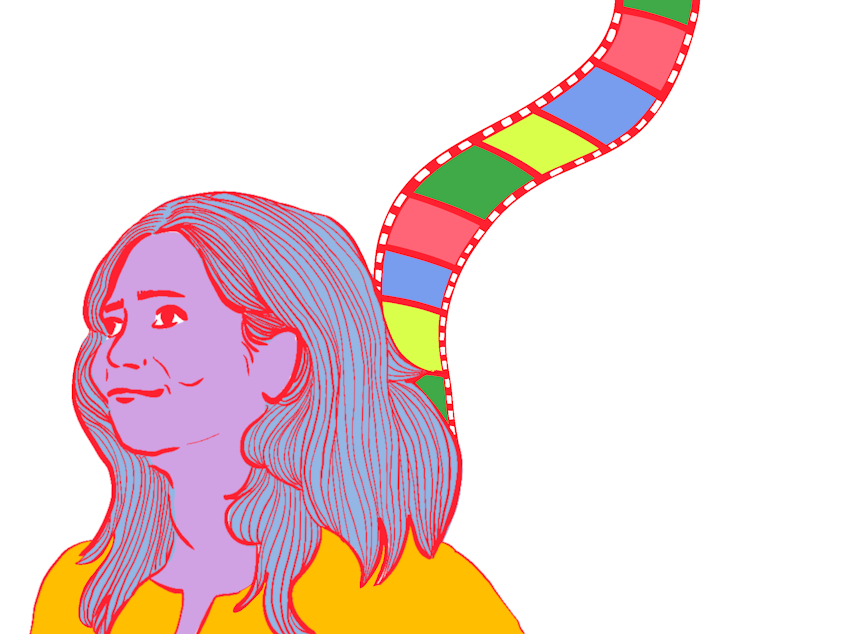Seattle leader ignites change by sharing caste identity

Back in February, the City Council voted to make Seattle the first city in the country to ban discrimination based on a person’s caste. Caste is like a social or economic class, but it’s hereditary. It doesn’t change.
The vote was a watershed for those who say that caste discrimination exists even in the United States. And for one supporter of the measure, it was a chance to open up about an identity that she had kept hidden.
RadioActive Youth Media’s Aliyah Musaliar has more.
[RadioActive Youth Media is KUOW's radio journalism and audio storytelling program for young people. This story was entirely youth-produced, from the writing to the audio editing.]
R
ita Meher is the executive director of Tasveer, an arts organization that hosts the largest South Asian film festival in the country.
When the Seattle ordinance was proposed, Meher decided to speak out in support of it. She also decided to reveal her own identity. She told City Council members that she’s Adivasi.
“Adivasis are indigenous tribal communities who face caste discrimination and untouchability along with Dalits,” Meher said at the council meeting. “I’ve faced social and economic ostracism.”
Sponsored
“Adivasi” in Hindi can be translated as “original inhabitants." They’re sometimes regarded as the indigenous people of India.
In India, many tribal communities live in deep forests or mountains and are tied intimately to the land and issues of land sovereignty. There are more than 100 million Adivasis in India.
People of oppressed groups such as Adivasis and Dalits are often discouraged from sharing their identities because they fear persecution.
“Growing up, I was told by my family never to discuss this or tell anyone outside,” Meher said. “So I always grew up with this one hidden identity that I have to cover and protect from others.”
For Meher, being Adivasi meant being excluded her whole life from certain spaces.
Sponsored
“There were certain incidents that happened in my life that I was very scarred by it,” she said. “ I was asked to stand in front of the whole class like, 'Here are the SC and ST kids.' And immediately you would see a reaction or they would snicker at you.”
“SC” and “ST” stand for "scheduled castes" and "scheduled tribes." Adivasis are part of the latter and both are categories created by the Indian Constitution.
The Indian Constitution promotes an affirmative action strategy in jobs and higher education to uplift the socio-economic well-being of Adivasis and Dalits.
Meher went to Jawaharlal Nehru University, a competitive school where she was enrolled in a small class.
Sponsored
At the time, affirmative action was divisive, as it is in the U.S. In New Dehli — the home to Meher's University — there were intense protests against the policy.
Meher thought she kept her identity secret from her classmates.
“However, I was very naïve in thinking that none of my classmates knew that I belong to ST group,” she said.
After graduating, Meher was in an alumni group chat where she saw her former peers criticizing the admission of Adivasis like her. She decided to confide in another person in the chat.
“I said to one of my friends, 'I’m an Adivasi.’ And she said, 'Oh, I knew all along because it was put on a bulletin board, ST: Rita Meher, and so you were listed in ST,'" Meher said. "So I got really shocked and I left the group."
Sponsored
In the U.S., Meher continued to keep quiet about her identity. But when the Seattle ordinance was introduced, and she saw some of her friends supporting it, she decided it was time for her to say something.
“This is the time when I should come out because I've been seeing that the space is safe,” she said. “I had to make a decision to be authentic and real, and deciding that I have lived half of the century hiding. I'm 50 years old and now the next part of my life would be living by telling everyone who I am.”
But coming out and supporting the Seattle ordinance to ban caste discrimination did result in at least one broken friendship for Meher — with someone who was like a family member.
“It’s sad to see the opinion of this close friend, but I really truly believe that if they don't believe in this reality and support me in coming out, then this friendship and relationship is not real,” she said.
Meher's story was a 20-year-long process, a process of building trust, finding community, and a sense of belonging.
Sponsored
To Adivasis and Dalits who are thinking of sharing their story, Meher shares this:
“When I came out, a few of my close friends, who mentioned to me that they are also Adivasi, but they’re not ready to tell others yet. Everyone has their own journey of coming out, so they should do it in their own time when they feel empowered.”
And maybe in sharing her story, more folks can find the safety to share their truths as well.
This story was produced in a RadioActive Youth Media Advanced Producers workshop for high school and college-age youth. Production assistance by Merk Nguyen. Edited by Kamna Shastri. Consultation support by Guy Oron. Prepared for the web by Alayna Ly.
Find RadioActive on Instagram, TikTok, YouTube and Facebook, and on the RadioActive podcast.
Support for KUOW's RadioActive comes from the Bill & Melinda Gates Foundation Discovery Center and BECU.



